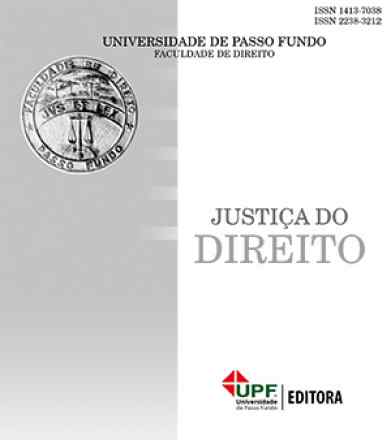A FRATERNIDADE COMO CATEGORIA MORAL EM UMA TEORIA DA JUSTIÇA DE JHON RAWLS
REVISTA JUSTIÇA DO DIREITO
A FRATERNIDADE COMO CATEGORIA MORAL EM UMA TEORIA DA JUSTIÇA DE JHON RAWLS
Autor Correspondente: V. L. Silva | [email protected]
Palavras-chave: justiça, fraternidade, doutrina moral abrangente, John Rawls, liberalismo.
Resumos Cadastrados
Resumo Português:
O presente artigo visa apresentar uma interpretação do sentido da categoria fraternidade
encontrada na obra de John Rawls. O propósito é apontar os limites da fraternidade no
âmbito de uma teoria liberal de justiça. Rawls definiu dois princÃpios de justiça para a constituição
duradoura de uma sociedade bem ordenada. O primeiro, a igualdade na distribuição
das liberdades básicas (civis e polÃticas); o segundo (princÃpio da diferença), consiste em
desigualar os indivÃduos nas situações práticas, para garantir maior bem-estar aos menos
favorecidos. Este último princÃpio confere um caráter fraterno à s instituições (distribuição
desigual de bens em benefÃcio dos desfavorecidos). A fraternidade, assim compreendida,
exige um ponto de partida moral especÃfico dos membros da sociedade, derivado de uma
noção metafÃsica de decisão humana e de sociedade. Esse ponto de vista moral, vinculado
a noções metafÃsicas, limita a democracia na sociedade bem-ordenada liberal rawlsiana.
Resumo Inglês:
This article aims at understanding the meaning of the discourse of fraternity found in the work of John Rawls. From this understanding it is possible to point out the limits of fraternity within a liberal theory of justice. Rawls would have defined two fundamental principles of justice for the lasting constitution of a well-ordered society. The first principle is equality in the distribution of basic (civil and political) freedoms. The second principle of justice (known as the principle of difference) is to unequal individuals in a practical situation, an expedient used to guarantee greater well-being to the underprivileged. The adoption of a principle that allows, in a democratic society, to adopt difference as a norm comes from the expectation that the correction in the distribution of certain basic goods can guarantee greater effectiveness of basic freedoms. Thus, the second principle of justice of John Rawls's Theory of Justice bases the distribution of basic goods on the basis of unequal rules for a democratic society. The principle of difference is the guarantee of a fraternal character to political institutions (unequal distribution of goods to the disadvantaged). However, fraternity understood as a political practice and as the foundation of public decisions requires a moral starting point, a kind of specific subjectivity, becoming a more comprehensive moral doctrine. This point is not confronted by Rawls, who considers fraternity a reasonable and non-comprehensive morality, since all individuals, under the supposed "veil of ignorance" and without any external coercion, would accept the two principles of justice (equal and different freedom consideration). The point is that such an affirmation starts from a metaphysical notion of human decision and society for the acceptance of the second principle of justice. Fraternity then becomes a moral point of view for making decisions, which finds its basis in a certain metaphysical notion. This would convert fraternity into a comprehensive morality whose characteristic is to exclude other political subjectivities. Because of the risk of exclusion, political and institutional decisions in a democratic regime can not find grounds for comprehensive morals. This would represent the closure of political activity, and, why not, a risk to liberal democratic societies. In this sense, there is a political limit to the fraternity category in Rawlsian theory.

